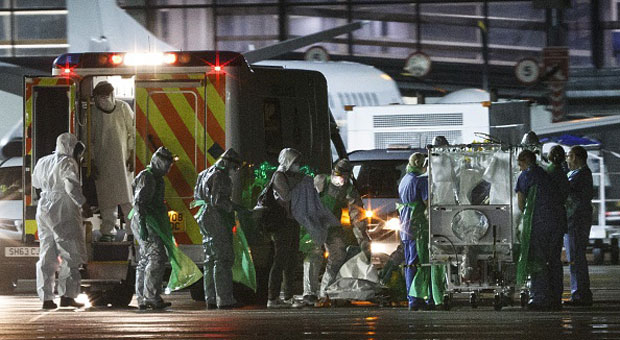Ebola: charity to investigate how British nurse caught the virus
Save the Children will 'leave no stone unturned' as Pauline Cafferkey's condition worsens in London hospital

A free daily email with the biggest news stories of the day – and the best features from TheWeek.com
You are now subscribed
Your newsletter sign-up was successful
Save the Children has launched a special investigation into how a British nurse contracted the Ebola virus while working for the charity in Sierra Leone, promising to "leave no stone unturned" in attempting to identify the source of the infection.
Pauline Cafferkey is in a critical condition and being treated in a specialist isolation unit at the Royal Free Hospital in north London. Yesterday, hospital officials said that the nurse's health was continuing to deteriorate despite her receiving an experimental anti-viral drug and blood serum.
The charity's Sierra Leone director, Rob MacGillavray, told the BBC that the investigation would go beyond a standard case review and scrutinise how protective equipment was used, as well as looking at person-to-person contact outside of the hospital where she worked.
The Week
Escape your echo chamber. Get the facts behind the news, plus analysis from multiple perspectives.

Sign up for The Week's Free Newsletters
From our morning news briefing to a weekly Good News Newsletter, get the best of The Week delivered directly to your inbox.
From our morning news briefing to a weekly Good News Newsletter, get the best of The Week delivered directly to your inbox.
"Because of this very serious event we have put in an extraordinary review to ensure that we do everything, leave no stone unturned, to be able to as far as possible identify the source of this infection," he said.
The 39-year old was working alongside a team of British healthcare workers treating infected patients in Sierra Leone's Kerry Town when she contracted Ebola.
She was first diagnosed after returning to Glasgow a week ago, via Morocco and London's Heathrow airport. She was screened for signs of the virus in London, but despite complaining that she felt she was developing a fever, she was allowed to continue her journey to Scotland after several negative tests.
Cafferkey is the first person to have been diagnosed with the disease in the UK, and the second Briton to be treated for Ebola. Nurse William Pooley made a full recovery from the illness last year after receiving the experimental zMapp drug. However, supplies of the drug have now run out.
A free daily email with the biggest news stories of the day – and the best features from TheWeek.com
Her case has raised concerns about Ebola screening at airports, which many argue is ineffective, and has led to calls to impose controversial quarantines for returning healthcare workers.
David Cameron has said he would consider implementing them but the Chief Medical Officer for England, Dame Sally Davies, is believed to be "unconvinced" by such measures, according to the Daily Telegraph. Some fear that quarantines will deter British healthcare workers from volunteering in West Africa , where assistance is still desperately required.
The disease continues to spread in the region, with the World Health Organization recently reporting more than 20,000 cases of the virus and almost 8,000 deaths, mainly in Sierra Leone, Liberia and Guinea, since the outbreak began.
-
 The 8 best TV shows of the 1960s
The 8 best TV shows of the 1960sThe standout shows of this decade take viewers from outer space to the Wild West
-
 Microdramas are booming
Microdramas are boomingUnder the radar Scroll to watch a whole movie
-
 The Olympic timekeepers keeping the Games on track
The Olympic timekeepers keeping the Games on trackUnder the Radar Swiss watchmaking giant Omega has been at the finish line of every Olympic Games for nearly 100 years
-
 Epstein files topple law CEO, roil UK government
Epstein files topple law CEO, roil UK governmentSpeed Read Peter Mandelson, Britain’s former ambassador to the US, is caught up in the scandal
-
 Iran and US prepare to meet after skirmishes
Iran and US prepare to meet after skirmishesSpeed Read The incident comes amid heightened tensions in the Middle East
-
 Israel retrieves final hostage’s body from Gaza
Israel retrieves final hostage’s body from GazaSpeed Read The 24-year-old police officer was killed during the initial Hamas attack
-
 China’s Xi targets top general in growing purge
China’s Xi targets top general in growing purgeSpeed Read Zhang Youxia is being investigated over ‘grave violations’ of the law
-
 Panama and Canada are negotiating over a crucial copper mine
Panama and Canada are negotiating over a crucial copper mineIn the Spotlight Panama is set to make a final decision on the mine this summer
-
 Why Greenland’s natural resources are nearly impossible to mine
Why Greenland’s natural resources are nearly impossible to mineThe Explainer The country’s natural landscape makes the task extremely difficult
-
 Iran cuts internet as protests escalate
Iran cuts internet as protests escalateSpeed Reada Government buildings across the country have been set on fire
-
 US nabs ‘shadow’ tanker claimed by Russia
US nabs ‘shadow’ tanker claimed by RussiaSpeed Read The ship was one of two vessels seized by the US military